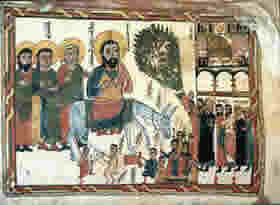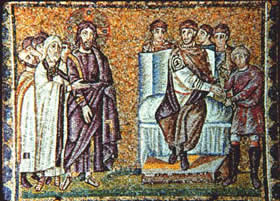"Jesus of Nazareth, King of the Jews"
The Feast of Christ the King
For Sunday November 21, 2010
Lectionary Readings (Revised Common Lectionary, Year C)
Jeremiah 23:1–6
Luke 1:68–79 or Psalm 46
Colossians 1:11–20
Luke 23:33–43
In her new book Nomad (2010), the outspoken critic of Islam Ayaan Hirsi Ali questions whether one can be both a good Muslim and a good American. Muslims can answer that question for themselves, but I was struck by the tension inherent in Ali's observation that there's an inherent conflict of interest between religious identity and political allegiance. Her question looms large this Sunday when Christians end the liturgical year by celebrating the feast of Christ the King, and next week marking the first Sunday in Advent and the beginning of a new liturgical year. To what extent can you be a good American and a good Christian?
 |
Jesus's Triumphal Entry, Medieval Syriac manuscript. |
The earliest followers of Jesus, and especially his detractors, used the political language of kingship to describe who he was, what he said, and what he did. Every king enjoys a reign, a rule, and a kingdom. Jesus was no exception. His very first words of public ministry proclaimed that in him "the kingdom of God is at hand" (Mark 1:15). But as we shall see, his ideas about kingship radically subvert our normal definitions of political power.
At the birth of Jesus pagan magi inquired, "where is he who has been born king of the Jews?" (Matthew 2:2). Their worship of Jesus with extravagant gifts reminds us that Jesus is not only the king of the Jews; he's the king of all nations and peoples. In contrast to our propensity to privilege one ethnicity or people over another, to view one's own people as exceptional to God, and to exclude other people who are different, the pagans from Persia show how king Jesus welcomes all people everywhere.
Whereas the magi worshipped king Jesus, king Herod tried to kill him. We don't normally associate the birth of a baby with the demise of political power, but Matthew does. His political parody is writ large. Matthew contrasts two rival kings who rule not only over one people (the Jews) but over all the world. This is a baby, says Luke, who would "bring down rulers from their thrones" (Luke 1:52). No wonder that in the 1980s the government of Guatemala prohibited the public reading of Mary's subversive Magnificat — if Jesus is king and lord, then Caesar, Herod, Pharaoh, Pilate, and Mammon are not lords. They are posers to be deposed.
The language of kingship also characterizes the accounts of Jesus's death. His "triumphal entry" into the clogged streets of Jerusalem on Good Friday was a deeply ironic, highly symbolic, and deliberately provocative act. It was an enacted parable or street theater that dramatized his subversive mission and message. He didn't ride a donkey because he was too tired to walk or because he wanted a good view of the crowds. The Oxford scholar George Caird characterized Jesus's triumphal entry as more like a "planned political demonstration" than the religious celebration that we sentimentalize today.
 |
Mosaic of Christ before Pilate, Basilica of Saint Apollinare Nuovo, 6th century. |
Borg and Crossan imagine not one but two political processions entering Jerusalem that Friday morning in the spring of AD 30. In a bold parody of imperial politics, king Jesus descended the Mount of Olives into Jerusalem from the east in fulfillment of Zechariah's ancient prophecy: "Look, your king is coming to you, gentle and riding on a donkey, on a colt, the foal of a donkey" (Matthew 21:5 = Zechariah 9:9).
Jesus was later dragged to the Roman governor's palace for three reasons, all political: "We found this fellow subverting the nation, opposing payment of taxes to Caesar, and saying that He Himself is Christ, a King" (Luke 23:1–2). In short, Jesus died as a politically subversive criminal.
Pilate met the angry mob outside the praetorium, then grilled Jesus alone back inside. "Are you the king of the Jews?"
"My kingdom is not of this world," Jesus replied. "My kingdom is from another place."
"You are a king, then!" mocked Pilate.
"Yes, you are right in saying that I am a king."
Pilate went back outside, declared that Jesus was innocent, then had his soldiers beat, flog, and humiliate him with purple robes and a crown of thorns befitting a man whom he miscalculated was a political failure: "Hail, O king of the Jews!" they mocked.
Back outside, the mob hounded Pilate: "If you let this man go, you are no friend of Caesar. Anyone who claims to be a king opposes Caesar." Pilate thus found himself sandwiched between angering the mob and betraying his emperor.
He caved in: "Here is your king. Shall I crucify your king?"
"We have no king but Caesar!" This tragic reduction of human identity to politics characterizes our own age.
When Pilate crucified Jesus, he insulted the Jews one last time by fastening a notice to the cross, written in Aramaic, Latin, and Greek, that he knew would offend them: "Jesus of Nazareth, King of the Jews." They objected, of course: "Don't write 'The king of the Jews,' but that this man claimed to be king of the Jews."
It was too late: "What I have written, I have written," said Pilate. To be sure, with his mockery of the Jews he wrote much more than he ever could have known or imagined (John 18:28–19:22), for later believers would worship Jesus not only as king of the Jews, but also as "the king of kings" (1 Timothy 6:15, Revelation 19:16), the "king of the ages" (Revelation 19:3), and "ruler of the kings of the earth" (Revelation 1:5).
When Jesus insisted that his kingdom was "not of this world" he didn't mean that it was merely spiritual, or relegated to a future age beyond history or in heaven. Far from it, as his detractors rightly surmised. In its simplest terms, the kingship that Jesus announced and embodied is what life would be like on earth, here and now, if God were king and the rulers of this world were not (Borg, Crossan). Imagine if God ruled the nations, and not Obama, Medvedev, Kim Jong-il, Mugabe, or Mahmoud Ahmadinejad.
Cucifixion icon, Sinai, 8th century. |
Every aspect of personal and communal life would experience a radical reversal in such a kingdom. The political, economic, and social subversions would be almost endless — peace-making instead of war mongering, liberation not exploitation, sacrifice rather than subjugation, mercy not vengeance, care for the vulnerable instead of privileges for the powerful, generosity instead of greed, humility rather than hubris, and inclusion rather than exclusion. The ancient Hebrews had a marvelous word for all this, shalom, or human well-being.
And so in the texts for this week we read how Jesus is a king who gathers rather than scatters (Jeremiah 23). Instead of waging war, "he makes wars cease to the ends of the earth; he breaks the bow and shatters the spear, he burns the shields with fire." (Psalm 46:9). Jesus the king welcomes criminals (Luke 23:43). In the mission and message of Jesus, says Paul, God intends to "reconcile to himself all things, whether things on earth or things in heaven, by making peace through his blood" (Colossians 1:20). Peace and reconciliation for all of creation are thus signs of the kingdom of God in Jesus.
The Lord's Prayer just might be the most subversive of all political acts: "Thy kingdom come, thy will be done, on earth as it is in heaven." People who live and pray this way have a very different agenda than caesar's, whether Republican or Democrat, whether capitalist, socialist or communist, whether democratic or theocratic, for they have entered a kingdom, pledged their allegiance to a ruler, and submitted to the reign of Christ the King.
For further reflection
* Why has Christianity embraced political power down through the ages?
* In what sense can prayer be political or subversive?
* What did Jesus mean when he said "render to Caesar what is Caesar's and to God what is God's?" Mark 12:17.
* What did Paul mean when he told believers to "submit to the governing authorities?" Romans 13:1–7. Remember that Paul lived under Nero.
* Consider Peter: "Fear God, honor the king." 1 Peter 2:17.
* Consider Paul: "Our citizenship is in heaven." Philippians 3:20.
Image credits: (1) Christopher Haas, Department of History, Villanova University; (2) Robert W. Brown, Dept. of History, University of North Carolina Pembroke; and (3) Jugoslav Ocokoljić.





